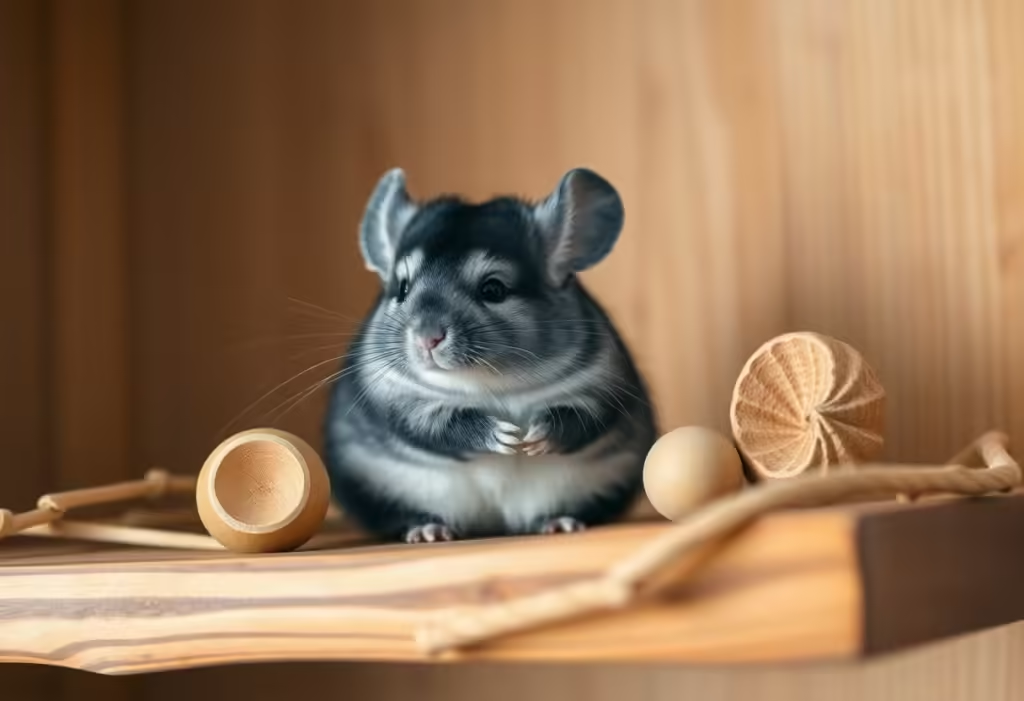Choosing the right wood for your chinchilla is essential to ensure their health and safety. Some woods are non-toxic and help keep their teeth healthy, while others can be harmful and should be avoided. This guide will help you identify which woods are safe for your chinchilla and which ones you need to stay away from.
Quick Answer:
- Safe woods for chinchillas include apple, birch, aspen, and kiln-dried pine. Always use clean, untreated wood to avoid harmful chemicals.
- Unsafe woods include cedar, cherry, and oak, which can be toxic to chinchillas.

Safe Woods for Chinchillas
Here are safe woods that are non-toxic and ideal for chinchillas to chew on:
- Apple: Safe and commonly used for chinchilla toys and chews.
- Ash: Provides a great chewing option.
- Aspen: Popular for its low resin content.
- Birch: White birch is ideal, as it doesn’t release harmful oils.
- Bamboo: Generally safe, but check for splintering.
- Cottonwood: Soft and suitable for chewing.
- Crabapple: A safe alternative to apple wood.
- Elm: Non-toxic and a good choice for chinchillas.
- Fir: Safe and soft, suitable for chinchilla toys.
- Grapevine: Great for natural chewing options.
- Hazelnut: Another safe option for toys and chews.
- Kiln-dried Pine (KD Pine): Must be kiln-dried to be safe; avoid fresh pine.
- Magnolia: Safe for chewing and environmental enrichment.
- Manzanita: Non-toxic and durable, a good option for active chinchillas.
- Pear: Safe and widely available.
- Poplar: A soft wood that’s safe for chinchillas.
- Willow: Safe as long as it’s not White Willow.
- Yucca: Soft and safe for chinchilla chews.
Tip: Always inspect the wood for splinters, cracks, or sharp edges before giving it to your chinchilla. Ensure the wood is untreated and thoroughly dried.
Unsafe Woods for Chinchillas
Avoid the following woods as they are toxic or harmful to chinchillas:
- Almond
- Apricot
- Beech (Some sources disagree, so avoid to be safe)
- Black Locust
- Cedar (Toxic oils can cause respiratory issues)
- Cherry (Contains compounds that can harm chinchillas)
- Cypress
- Ebony
- Elderberry
- Eucalyptus
- Fir (Douglas)
- Fresh Pine (Only kiln-dried pine is safe)
- Juniper
- Mahogany
- Mango
- Oak (Highly toxic to chinchillas)
- Peach
- Plum
- Pressure-Treated Wood (Avoid due to chemicals used in treatment)
- Stained or Painted Wood (Toxic chemicals may be ingested)
How to Safely Introduce Wood to Your Chinchilla
- Check the Type: Always use the safe wood options listed above. If you’re unsure about a type of wood, consult a vet or chinchilla expert before introducing it.
- Prepare the Wood: Ensure that the wood is clean, untreated, and thoroughly dried. Fresh wood can carry moisture and toxins, so kiln-dried options are best.
- Inspect for Safety: Regularly check the wood for splinters, cracks, or sharp edges that could harm your chinchilla. Replace any worn or damaged wood immediately.

Expert Tips for Using Wood in Chinchilla Habitats
Veterinarian Tip: Always prioritize untreated, natural wood for your chinchilla’s habitat and toys. Chinchillas are sensitive to chemicals and toxins, so avoid any wood that has been treated, painted, or stained. Even natural woods can pose risks if not properly dried or inspected.
Bonus Tip: Be cautious with wood sourced from the outdoors or your garden. Wood exposed to pesticides or chemicals, even indirectly, could pose a health risk to your chinchilla. Always use wood that is safe and untreated.
Conclusion
Providing safe wood for your chinchilla is essential for their health and well-being. Stick to safe wood options like apple, birch, and kiln-dried pine, and avoid toxic woods such as cedar, cherry, and oak. Always ensure the wood is clean, untreated, and dried before giving it to your chinchilla. With these precautions, your chinchilla can enjoy a healthy environment with safe and enriching wood to chew on.
For more details and expert advice on chinchilla care, always consult trusted sources or your veterinarian to ensure the safety of your pet.
FAQ
What types of wood are safe for my chinchilla to chew on?
Safe wood options include apple, aspen, birch, kiln-dried pine, cottonwood, and manzanita. Make sure the wood is clean, untreated, and dry before giving it to your chinchilla.
Can chinchillas chew on fresh wood?
No, fresh wood is not safe for chinchillas due to moisture and potential toxins. Only use kiln-dried wood to ensure it’s safe for your pet.
Why is cedar wood unsafe for chinchillas?
Cedar contains oils that are toxic to chinchillas, especially when used as bedding or chew toys. It can cause respiratory issues and other health problems.
How do I prepare wood for my chinchilla?
To prepare wood for your chinchilla, make sure it’s a safe type (such as apple or birch), wash it thoroughly, and ensure it’s completely dry or kiln-dried. Avoid wood that’s been treated or exposed to chemicals.
Can I give my chinchilla wood from my backyard or park?
It’s best to avoid wood from your backyard or a park unless you can confirm the type of wood and that it’s safe. Unknown or untreated wood could be harmful, so stick to the safe woods listed above.
